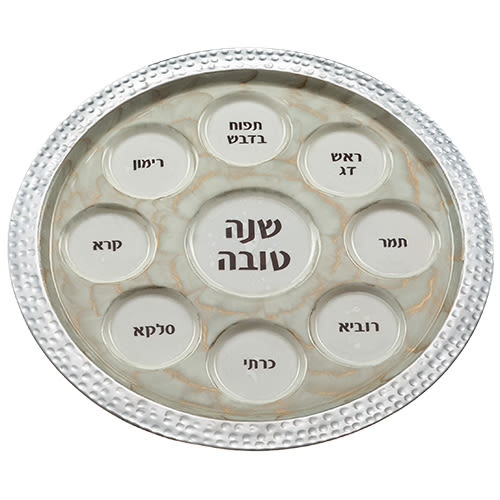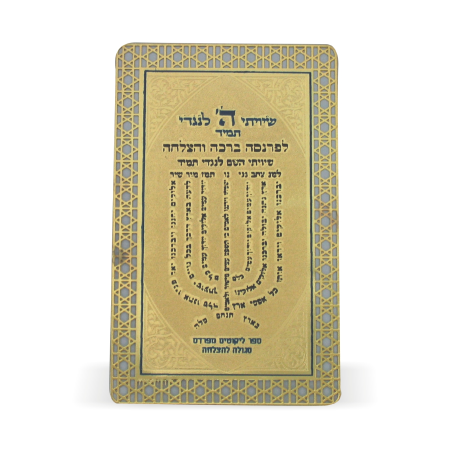
The Expansions of “Havayah”
All of creation stems from the Name of Havayah and its expansions, each of which contains the ten sefirot.

Opening 22
The musical notes, vowel signs, crowns and letters are governed under the order of the ten Sefirot included in the Name of Havayah and its expansions.
Note: When each of the four constituent letters of the holy Name of Havayah is spelled out in full (Heb. Maleh), the resulting holy name is known as an “expansion” (Heb. Milui, literally a “filling”) of the root name. The “filling” of the letter Yod is constant (YOD), but the letter Heh may “filled” either with a Yod (Hey), Aleph (Hea) or He (Heh), while the letter Vav may be spelled in full either with a Yod (Viv) or Aleph (VAV), or with neither (VV). Different spellings of the constituent letters of the Name produce different “expansions” with their own characteristic gematria or numerical sum. The four main expansions of HaVaYaH take their names from their gematria:
AV Yod Hey Vyv Hey, numerically totaling 72
SaG Yod Hey VAV Hey, numerically totaling 63
MaH Yod HeA VaV HeA, numerically totaling 45
BeN Yod HeH VV HeH, numerically totaling 52.
All of the various kinds of functions found in the Sefirot are without exception governed under the order of the ten Sefirot, which is the order constituted by the four letters of the Name, blessed be He. And this is the order that governs the musical notes, vowel signs, crowns and letters through the four letters and four names contained in each one of them.
The proposition has two parts: Part 1: All of the various kinds… This explains that all the different orders fall under this overall order. Part 2: And this is the order… This explains how the musical notes, vowel signs, crowns and letters fall under this order.
Part 1: All of the various kinds of functions found in the Sefirot are without exception governed under the order of the ten Sefirot… All of the different categories we distinguish in the Sefirot apply to everything. Thus each Sefirah divides into ten Sefirot, for each Sefirah and every part of each Sefirah contains the entire order of government (except that in any given case the particular Sefirah in question has more influence). Accordingly, wherever we look, we will always immediately distinguish ten divisions corresponding to the ten Sefirot. Even where the lights need to divide in other ways in order to carry out their function, nevertheless everything must come under this tenfold division. Each of the different levels divides into its own individual levels, but overall they make up a total of ten levels.
…And this is the order of the four letters of the Name, blessed be He. The four letters of the Name of Havayah, blessed be He, contain all the ten Sefirot according to their essential division into five Partzufim. Thus the cusp of the Yud is Arich Anpin (=Keter) while its main body is Abba (=Chochmah). The first Heh is Imma (=Binah), the Vav is Zeir Anpin (=Chessed-Gevurah-Tiferet-Netzach-Hod-Yesod), while the final Heh is Nukva (=Malchut).
Part 2: And this is the order that governs the musical notes vowel signs, crowns and letters through the four letters… The musical notes vowel signs, crowns and letters are all separate functions, each of which emerges from its own particular source. Yet all are governed under the overall order, which is that of the Name of Havayah, blessed be He. …and the four names… namely AV, SaG, MaH and BaN, which are the four expansions of the Name, which also correspond to the four letters …contained in each one. Each one of the four levels — the musical notes, vowel signs, crowns and letters — contains the four root letters of the Name and the four expansions of AB, SaG, MaH and BeN. Thus each of these four levels extends as a complete array of ten Sefirot, which are contained in the four letters and four names we have mentioned.
(Rabbi Avraham Greenbaum is the director of Azamra (http://www.azamra.org/). The 138 Openings of Wisdom is available for purchase online at http://www.azamra.org/Product_pages/openings.htm)














Tell us what you think!
Thank you for your comment!
It will be published after approval by the Editor.